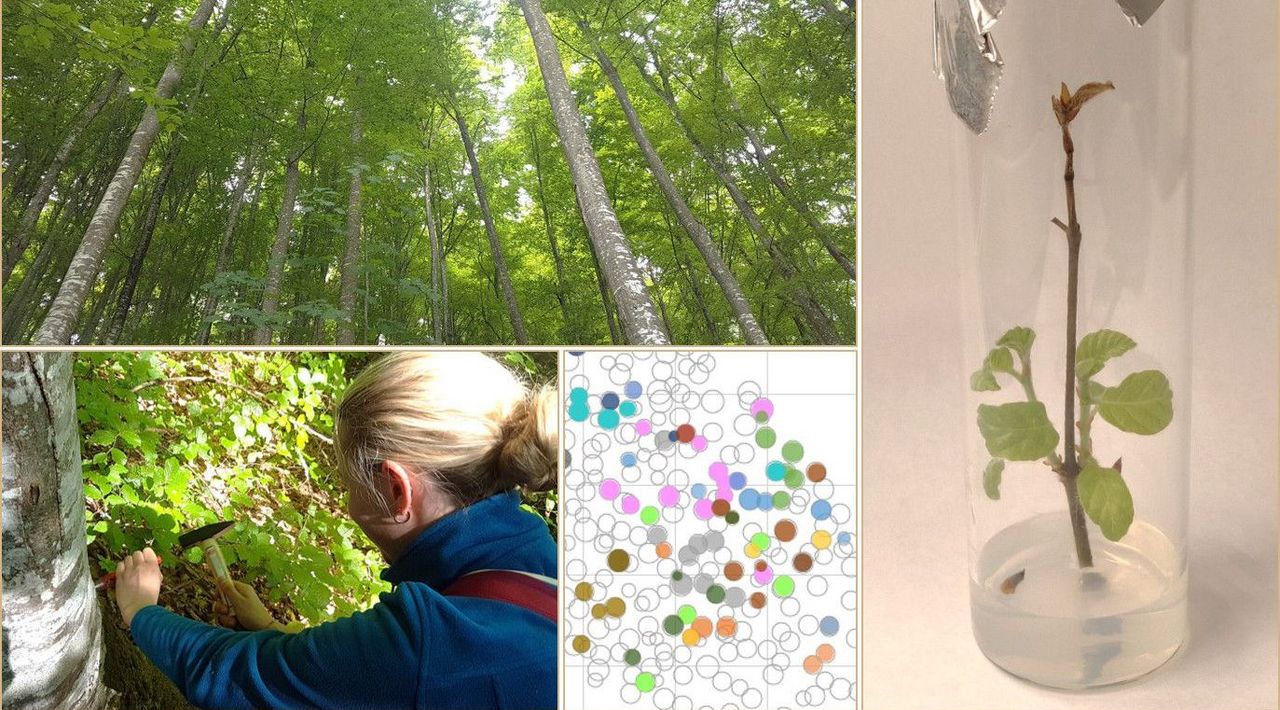Project
Genetics and dendroecology of European beech

Research Focus Genetics and Dendroecology of European Beech – Drought Stress, In-Vitro-Propagation and Genomics
European beech is the most important native broad-leaved tree species in Germany, both ecologically and economically. Due to this, the study of adaptation and adaptive potential in beech is therefore of central importance.
Background and Objective
European beech (Fagus sylvatica) is the most important native broad-leaved tree species in Germany,
both ecologically and economically. The study of adaptation and adaptive potential of beech is therefore of
central importance.
In three complementary sub-projects, the Thünen-Institute, TU Dresden and the University of Freiburg study the adaptation and adaptive potential with regard to drought tolerance as an important ecological trait. Additionally, new technological approaches and extensive genetic resources will be developed to aid future research and adaptation of beech and beech forests to changing environmental conditions.
In order to achieve these goals, a diverse array of methods will be employed, ranging from provenance research and dendroecology to population genetics and genomics as well as in-vitro-technologies. We study the degree of genetic and environmental control on drought tolerance in naturally regenerating populations and the adaptability to drought stress in different provenances from the entire distribution range of European beech.
Next generation sequencing is used to generate whole-genome resequencing data of 1000 individual beech trees together with corresponding phenotypic data. Additionally, a collection of 200 easily propagated, genetically and phenotypically well characterized in-vitro-clones will be established. These resources open up entirely new possibilities for the study of adaptive traits in the lab, in field trials and in natural populations.
Approach
The project employs methods ranging from provenance research and dendroecology to population genetics and genomics as well as in-vitro-technologies. To reach their respective goals, all research is conducted on the same sites and in the same populations, wherever possible.
Population genetic methods are used to identify the relationship between trees in different beech populations in southern Germany. Dendroecological methods are then used to quantify the individual drought tolerance of these trees. By correlating relatedness and drought tolerance, the genetic and environmental components of drought tolerance can be assessed.
Dendroecological methods are also employed to quantify the drought tolerance of different provenances from the entire distribution range of beech. Provenance research methods are used to compare different provenances regarding their drought tolerance. This allows selection of drought tolerant provenances or single trees in order to aid the adaptation of beech forests to a dryer climate.
Next-generation-sequencing platforms are used to obtain the complete genomes of 1000 individual beech trees representing 100 provenances. The same trees will be phenotyped. The correlation of genotype and phenotype allows to infer the genetic architecture of the studied traits. The genomes can also be used to study traits that will be measured in the future and therefore form the basis for future genomic research on beech.
Starting with seeds and buds, biotechnological methods are used to select and establish 200 easily propagated In-vitro-clones of beech. These will mostly be obtained in the field trials and populations that are also studied by the other subprojects and therefore represent genetically and dendroecologically well-characterized plants. These form the basis for future research, for example regarding the responses to environmental stress or pathogens.
Involved Thünen-Partners
Involved external Thünen-Partners
-
Technische Universität Dresden
(Dresden, Tharandt, Deutschland) -
Albert-Ludwig Universität Freiburg
(Freiburg, Deutschland)
Funding Body
-
Fachagentur Nachwachsende Rohstoffe e.V. (FNR)
(national, öffentlich)
Duration
4.2022 - 3.2025
More Information
Project funding number: 2219WK60A4
Project status:
ongoing

![[Translate to English:] [Translate to English:]](/media/_processed_/f/3/csm_2022_Titelbild_gross2_Saatgut_in_Hand_9ffb8f5748.jpg)
![[Translate to English:] [Translate to English:]](/media/_processed_/f/3/csm_2022_Titelbild_gross2_Saatgut_in_Hand_c17270fcc0.jpg)
![[Translate to English:] Logo des Bundesministerium für Ernährung und Landwirtschaft](/media/allgemein/logos/BMEL_Logo.svg)